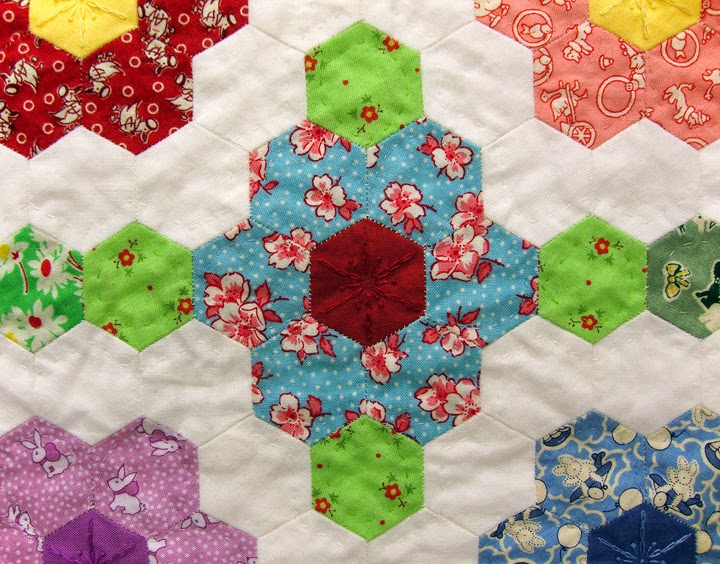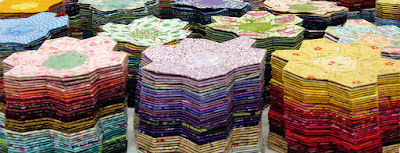As followers may recall, I started hand stitching hexies for a Grandmother's Flower Garden quilt in March, 2012... three years ago. Watching my friend, Christy, basting sweet, reproduction fabrics around paper forms, making little stacks of 3/4-inch hexagons, I just couldn't resist! These Beadlust posts show the various steps to making the quilt top and the start of hand-quilting in more detail than this post.
Although I'm still hand-quilting, the end is in sight now. I'm hoping to finish in time for our County Fair in August.
In this post, I thought it might interest you to look at how much time it takes to complete each of the steps in hand piecing and quilting a 3/4" hexie quilt, and the total number of hours involved. I'm basing time estimates for all of the repetitive steps on how long it takes me to do a large number in one sitting, after having practiced... in other words, at my best speed.
Step 1 - Planning the Quilt and Getting Fabrics - time: 20 hours
I decided to make a version of the traditional 1930's Grandmother's Flower Garden quilt that is less common than the one with a path or ring around each of the flowers. I chose this design. Note the green hexie leaves, which form a vertical-horizontal grid.The final size is 72 x 92 inches, a comfortable size for a twin bed, a total of 4,694 hexies. I wanted to use as many different fabrics in this quilt as possible.
- flowers = 280 different print fabrics with any background color except green or white.
- leaves = 150 different print fabrics in green
- flower centers (repeats OK) = 25 different solids
- double border = 1 print + 1 solid
Step 2 - Wash and Iron all of the Fabrics - time: 15 hours
Yikes! A few of the fabrics I wanted to use were already washed; most were not. Knowing it should be consistent, and worrying that the reds might bleed, I decided to pre-wash and iron all of the fabrics. Doing this step in stages, as I acquired fabrics, I'm not really sure how long it took, perhaps quite a bit more than the above estimate.Step 3 - Cutting and Trimming all of the Hexies - time: 28 hours
For each of the 4,694 hexies, I cut a 2" square of fabric, and trimmed off the four corners. Of course, I cut and trimmed in multiples, except for a few that I fussy cut individually. Again, since I did this step in stages, the above time estimate is a bit rough.Step 4 - Basting the Fabric to the Paper Hexie Forms - time: 235 hours
Step 5 - Stitching Hexies Together to Make Flowers - time: 105 hours
Averaging 2.5 complete flowers per hour, it took me about two and a half 40-hour-work-weeks to whip-stitch all 238 full and 42 partial flowers. There are 14-17 whip-stitches per 3/4 inch seam.Step 6 - Stitching a White Hexie Ring Around 130 of the Flowers - time: 130 hours
On average, it takes me 1 hour to whip-stitch 12 white hexies around each flower.Step 7 - Layout Flowers for Quilt Top; Note Position on Each - time: 4 hours
I didn't fuss too much about the layout, spreading out the flowers randomly, making sure the red ones were evenly spaced, and that no areas were overly dominated by one color. Assigning each row a letter and each position within the row a number, I marked each flower on the back (writing on the center paper piece).Step 7a - Half Flowers and Double Border All Around - time 90 hours
This is an update, added Feb. 2018. (I can't believe I forgot this important step when writing the original time line.) To make 42 partial flowers to fill in the gaps around the edges of the top, I cut fabrics, basted hexies, joined petals, and then stitched the partials into the gaps. To make the outer border, I made 522 individual hexies, stitched them into rows, and then stitched the rows onto the top.
Step 8 - Sew Flowers into Small Groups - time: 90 hours
To assemble the quilt top, I grouped 8-12 flowers, and whip-stitched them into a solid piece. There were 30 pieces, which took about 3 hours each to complete.Step 9 - Sew Small Groups Together to Complete Quilt Top - time: 123 hours
I first sewed the small groups into rows, then stitched the rows together. As the sections got larger, the stitching took longer, making it difficult to estimate the time with total accuracy. I did a couple of time tests at different stages of the process in order to figure the above total. I completed this step on March 1st, 2013, one year after basting the first hexie.Step 10 - Iron/Starch Top, Remove Papers and Basting Stitches - time: 33 hours
Removing all the basting stitches and papers took a lot longer than I would have guessed. But when I look at the pile of basting threads, it begins to make sense.Step 11 - Assemble Quilt Layers, and Baste - time: 12 hours
Christy and Lunnette helped me layout the back, batting, and top on the floor; then baste in a 4 inch grid. I think we pinned it first, then basted, then removed the pins. On our knees for most of the time, it sure was wonderful to have their help!Step 10 - Quilt and Embroider the Flower Centers - time: 70 hours
Choosing a floss in a similar color to each flower center, I embroidered a flower. Intentionally, some of the stitches act as quilting stitches, while others slip between the layers and don't show on the back. Around the edges of the quilt, it took about 15 minutes per flower center. Toward the middle of the quilt, it took about 20 minutes per flower center.Step 11 - Quilt Flower Petals - time: 106 hours
Quilting around the petals of each flower requires turning the quilt 270 degrees for each petal, which is why it takes at least 20 minutes per flower, longer toward the middle of the quilt when the whole weight of the quilt must be constantly shifted. There are 238 whole and 42 partial flowers. I'm figuring an average of 25 minutes per whole and 10 minutes per partial flower.Step 12 - Quilt Around White Rings - time: 65 hours
Step 13 - Quilt Around Each of the Leaves - time: 79 hours
Not only does this step require turning the quilt as I stitch 360 degrees around each leaf, it also requires knotting and burying the tail at the start and finish of each leaf. Also I'm changing color of thread to more or less match the fabric color for each set of 4 leaves. Around the edge, it takes about 9 minutes per leaf; toward the center 11 minutes per leaf. There are 474 leaves total, at an average of 10 minutes/leaf.Step 14 - Assemble Hexies for the Border Facing - time: 37 hours
To face the double (print + blue) border on the back of the quilt requires 522 hexies. To sew them together, forming the border strips, takes about 1 hour per 14 hexies.Step 15 - Trim Backing and Batting; Blind-stitch Facing to Border - time: 13 hours
There are 264 hexies around the outside edge of the quilt top. Since I have not done this step yet, the time estimate (blind-stitching 20 hexies together per hour) is somewhat rough.Step 16 - Remove Paper Pieces and Basting from Border and Facing - time: 10 hours
Again, since I have not done this step yet, the time estimate is based on the time it took to remove paper pieces and basting threads from the quilt top.Step 17 - Blind-stitch Facing to Quilt Back - time: 13 hours
Step 18 - Quilt Around Print Fabric Border - time: 13 hours
Step 19 - Blanket Stitch Around Outside Edge of Quilt - time: 10 hours
* * * * * * * * * * * * * * * * * * * * * * * * * * * * * * * * * *Total Time to Complete Hand-Piecing the Quilt Top: 873 hours
This is equivalent to nearly 20 weeks or 5 months on a 40 hours/week job. It took me a year. Mostly the time flew by as I basted and hand-stitched the little hexies together. Always there was a new print to enjoy, a new stack mounting in size to admire, a growing quilt top to thrill me.Total Time to Complete Hand-Quilting: 428 hours
Since this job isn't completed yet, the time is only a rough estimate, based on the times it took to do some of the already completed steps. In all, hand quilting will take the equivalent to 10 or 11 weeks of full-time work. I find the quiltingTotal Time, Start to Finish: 1,301 hours
With Steps15-19 still to complete, the total is a rough estimate. Still, it is obvious that making a quilt like this, start to finish, requires more than 1,300 hours or the equivalent of over 8 months of full time work. If I were to be paid only minimum wages (2015, Seattle, WA - $11/hr.), the cost of the quilt would be $14,311 + about $500 in materials, or a total of $14,800. Good thing I intend to keep and use it myself!
UPDATE, July 4, 2016
By June, 2015, I completely finished one corner, an area big enough to photograph so I could submit an entry form to the 2015 La Conner Quilt Festival, sponsored by the La Conner Quilt & Textile Museum. On August 7th, 2015, I received notice that it was juried into the show. Wow! That sent me into high gear for sure. After working non-stop, 7 days a week, and an average of 10 hours per day, I inserted my needle into that quilt for the last/final time on Aug. 24th, 2015, just days before delivering it to the museum. It took me 3 years and 3 months, start to finish!
I was surprised, honored, and incredibly pleased to find out it won the Curator's Award of Excellence, one of the top awards, which then qualified it to be shown at the museum for the month following the Festival. Note, the finished size is 71 x 93 inches, and there are 4,700 individual hexagons in it.
Big work for both hands, but sooooo satisfying!
In fact it was so satisfying that I've started another hexie quilt... Can you believe it? So far, I've made 733 hexie flowers for it! Although they are the same size hexies, there are no reproduction fabrics and the arrangement will be anything but traditional. Don't know why I love the hexagon shape so much... but it's certain that I do.

































